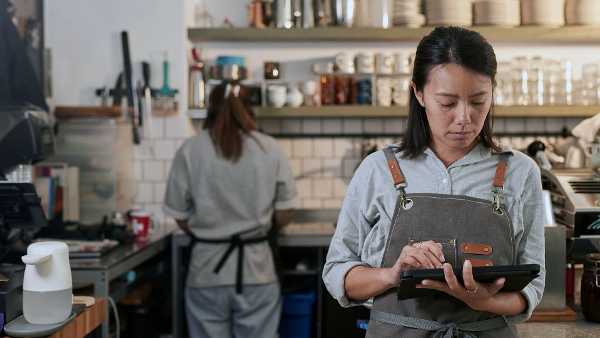Looking to start your own franchise formula? Here is what you need to know
- Amber Kuipers
- 9 July 2021
- Edited 12 May 2025
- 4 min
- Starting
You have come up with a successful concept and want to grow your business. One option is to open another branch, but you could also consider starting a franchise formula. Discover whether franchising is the right choice for you and your business and find out what goes into setting up your own franchise formula.
What do you need to arrange when starting a business?
Answer the questions on Business.gov.nl and see the steps that are important in your situation.
In this article, Cathy Kroone of Bagels & Beans will help you determine if franchising is right for you and discuss whether this approach to scaling up can help you achieve your growth ambitions.
1. What is a franchise formula?
A franchise is a partnership between an entrepreneur (franchisee) and the owner of a chain (franchisor). The franchisee runs the business according to the franchise formula and must comply with the agreements made with the franchisor. They enter into a contract for this purpose.
Franchises are common in the catering industry and retail, but there are also franchise formulas for funeral homes, daycare centres, financial advisors, gyms, and healthcare providers. Starting a franchise formula is therefore not just for large companies.
2. Is franchising the right growth model for you?
Cathy Kroone is responsible for recruiting and selecting franchisees at Bagels & Beans. For Kroone, franchising is a strategic choice. “You can also realise growth by opening branches and recruiting staff for each one, but you need a lot of capital for that approach. With franchising, franchisees are responsible for making investments and run the business at their own expense and risk. This makes collaborations less casual and guarantees that franchisers are as passionate about the business as you are.”
Kroone recommends that entrepreneurs thinking about a franchise formula answer the following questions first:
- Is my concept transferable: will it work if I copy the exact same concept in a different location?
- What added value can I offer to franchisees: why should someone choose my formula?
- Do I have time to create, sell, and monitor a franchise formula?
Answering these questions will help you decide if building a franchise formula is right for you.
3. How do I find franchisees?
Finding the right franchisees is crucial to the success of your formula. Kroone: “Determine whether you and the franchisee are a good match. They should believe in your concept and philosophy and be willing to work together. Be open and realistic when you meet potential franchisees and get to know each other. If both parties are convinced, you can take the next step together.” Recruit candidates through your website and social media channels or through online marketplaces such as and the National franchise (in Dutch).
Bagels & Beans is a hard-franchise formula, which means that the franchisor has a lot of control. Bagel & Beans decides on the corporate identity, purchasing, nationwide marketing, and menu of all formulas. “We need uniformity for our concept to succeed. But I always say: we are hard on the rules and soft on the relationship.” The cooperation between Kroone and her franchisees relies on 3 key factors:
- Commercial success
Can the franchisee make a good living? - Satisfaction
A satisfied franchisee will produce satisfied customers and staff. - Uniformity
Does the franchisee follow the formula’s rules? “It matters to us, of course, but it is important to other franchisees, too. Guests who have had a bad experience in one branch are unlikely to visit a different one with the same name.”
4. What is a franchise's revenue model
There are several fees that you can charge the franchisee:
- Startup fee
A one-time fee to join the formula. - Franchise Fee
A percentage of revenue that you remit periodically (usually monthly) to be part of the formula. - Advertising contribution
A contribution to the costs incurred by the franchisor for advertising and promotional activities.
These fees and percentages vary from one formula to the next.
5. What are the keys to success?
The Bagel & Beans franchise formula has expanded to 86 locations over the course of 26 years. Kroone describes what she sees as the factors for success.
Location
Finding the right locations for branches is just as important as finding the right franchisees. Investigate your options or have a specialised agency do a site survey. These surveys will reveal the size of your catchment area - where your customers can be found - and which competitors you will have to deal with, as well as providing information about the quality of the location in question and what turnover you can expect. Take a close look at local rules and regulations and talk to other business owners in the area to get yourself up to speed with the latest developments.
Good cooperation
Kroone believes in the power of open communication and equality. “For your formula to succeed, you have to invest in your relationship with franchisees. You both have skin in the game and will really need each other. For the franchise model to really shine, you have to work well together.”
A franchise manual
The franchise manual is a practical guide for franchisees. In it you set out operational and legal agreements such as rules on marketing, corporate identity, and purchasing. When writing the manual, put yourself in your franchisee’s shoes and make it easy to read. The manual should answer practical questions like: who can I place orders with and how? Franchise manuals are a living document and can be updated constantly.
Franchise council
You may choose to set up a franchise council to professionalise communication within the formula and decide on fixed times to consult and engage with franchisees. Kroone: “By regularly sharing experiences, ideas, and considerations, you get to keep your finger to the pulse, learn to understand other's interests, and make decisions together. The franchisees are often represented on the council by a limited number of members in order to ensure that meetings stay effective.”
The Franchise Act
The Franchise Act came into force on 1 January 2021. The aim of the Act is to balance the interests of franchisors and franchisees. An important part of the Act is to strengthen the franchisee's position in terms of information, even before both parties enter into the agreement. View the other rules that apply to .


